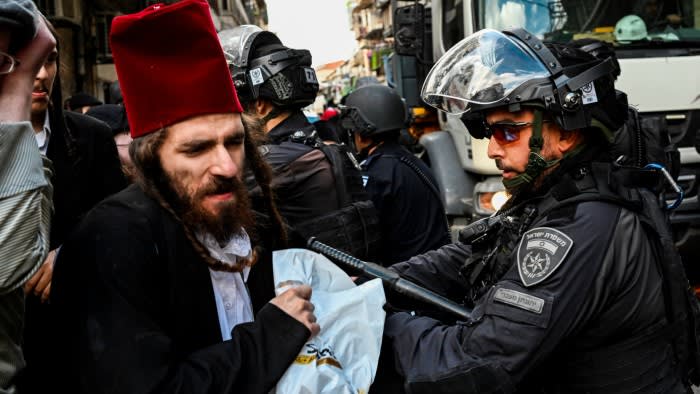Ya’akov Cohen shrugs off the prospect of a new law that will force young ultra-Orthodox men like him to abandon full-time study of Jewish scriptures and serve in the Israeli army.
“I can promise you that none of us students will leave the seminary,” he said. “We’ll continue to do what our people have done for hundreds of years: study Torah.”
Cohen is one of thousands of ultra-Orthodox Jews studying at seminaries — or “yeshivas” — who are exempt from mandatory military service. A dispensation that has grown increasingly contentious in Israeli society now threatens to blow Benjamin Netanyahu’s government apart.
The exemption has long irritated secular Israelis, who must all serve nearly three years in the army followed by years of reserve duty. But with the war in Gaza dragging on, and more than 250 soldiers killed in combat, that irritation has morphed into anger and a determination to change the status quo.
The issue has sharpened political divisions. Secular parties insist the “Haredim”, or ultra-Orthodox Jews, share Israel’s military burden while religious radicals have threatened civil disobedience and a war against the state if they are forced to enlist.
“There will be a rebellion the likes of which you’ve never seen before,” said Rabbi Avraham Manks, a hardline Haredi leader. “They are throwing grenades into our neighbourhoods, into our houses. And they are doing this in a country that’s at war.”
Thursday saw a dramatic escalation in the stand-off when Israel’s Supreme Court issued an interim order freezing state subsidies to ultra-Orthodox students who are eligible for conscription, triggering an outcry from the Haredi community. Leaders fear it is the harbinger of a full draft.
Secular groups were jubilant. Eliad Shraga, head of the Movement for Quality Government in Israel, which had filed a petition against the government over the Haredi carve-out, called it a “solid, brave response”.
“Sharing the burden equally is an existential necessity for Israel,” he said. “We won’t allow them to discriminate like this between different groups of people.”
The current system has been subject to frequent legal challenges, one of which was upheld by the Supreme Court in 2017. But successive governments delayed implementation as they sought a compromise. The latest delay expires on Monday.
“If Netanyahu doesn’t come up with a solution in the next couple of days that protects the yeshiva students and appeases the Haredim, the government will fall,” said Moshe Roth, an MP for United Torah Judaism, one of the ultra-Orthodox parties in Netanyahu’s coalition. “This is a make-or-break issue.”
The prime minister faces a delicate balancing act that will test his vaunted survival skills to the limit. If he scraps the exemption, the Haredi parties might quit his government. But if he tries to preserve it, he risks forfeiting the support of the centrists like Benny Gantz, a former general and member of the war cabinet, who wants it abolished.
A collapse of the coalition could hasten new elections that polls indicate Netanyahu would lose.
For weeks the prime minister has dodged a final decision, but Thursday’s order showed the judges were losing patience with his prevarication.
“They were basically saying, that’s it, you can’t play around any more, you have to find a solution that will satisfy us,” said Eliezer Hayun, a researcher at Tel Aviv University’s school of social and policy studies and an expert on the Haredim.
Ya’akov Cohen, who studies at the Beit Matityahu yeshiva in Bnei Brak, an ultra-Orthodox suburb of Tel Aviv, would be one of those affected by a change in the law. Speaking during a break between study sessions, he said secular people failed to recognise the unique contribution Haredi scholars made to society.
“We sacrifice our whole life,” he said. People like him, he added, could earn good money as doctors or lawyers, or in the world of academia. Instead, they “have eight children and earn very little”.
Dressed in the standard white shirt and black trousers of a yeshiva student, Cohen denied the Haredim lack a sense of solidarity with other Israelis.
“We pray three times a day for the soldiers, we respect them, we rejoice at their successes and mourn their losses,” he said. Their prayers were, he added, aiding the Israeli war effort. “Haredim believe that the force of the Torah is strong and great. It has massive power.”
The exemption has its roots in a deal David Ben-Gurion, Israel’s founder, struck with ultra-Orthodox leaders in the early days of the state that allowed 400 yeshiva students to devote themselves to full-time Torah study. In exchange they agreed to support the Zionist project.
But now the Haredim make up 13 per cent of Israeli society. Many Haredi men receive government stipends far into adulthood, studying Torah rather than pursuing paid jobs. Critics say the arrangement is economically unsustainable, considering how fast the ultra-Orthodox population is growing.
But Israel Cohen, a Haredi broadcaster and commentator, said Israelis failed to understand how fraught the draft issue is for Haredi rabbis desperate to shield their young men from the temptations of secular society and preserve the community’s traditional way of life.
“Ben-Gurion wanted the army to be a melting pot that would create a ‘new Israeli’, and the Haredim are scared of that,” Cohen said. “They say the yeshivas protect them from that.”
He fears that any decision to impose the draft will ultimately radicalise the more moderate, mainstream elements of Haredi society who are open to a compromise. “Do they really want a million-man demo of people refusing to serve?” he asked.
Hayun said a compromise was possible. The state could enlist those young Haredi men who are formally enrolled in yeshivas but don’t actually attend lessons. There is also an option of letting the men serve in their own communities, such as in religious charities or in Haredi hospitals.
But the stakes are high. “It’s very hard for the rabbis to show any flexibility on this issue,” he said. “For them it’s a religious matter, not just a cultural thing. If they harm the religion, they will answer for that in the afterlife.”
Also Read More: World News | Entertainment News | Celebrity News









